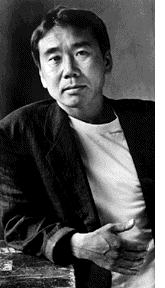Haruki Murakami is back
 Blind Willow, Sleeping Woman, is the new collection of short stories from the Japanese magical realist. Short stories, Murakami has admitted, are "a kind of experimental laboratory for me as a novelist." Anyone who has read Murakami's novels will notice that some of the stories in Blind Willow are beginnings or snippets that were later developed into novels. Read the review on Salon, NY Times, the Guardian. The Kobe-reared author is featured in this month's Times books section. Click here for interviews and reviews of past works.
Blind Willow, Sleeping Woman, is the new collection of short stories from the Japanese magical realist. Short stories, Murakami has admitted, are "a kind of experimental laboratory for me as a novelist." Anyone who has read Murakami's novels will notice that some of the stories in Blind Willow are beginnings or snippets that were later developed into novels. Read the review on Salon, NY Times, the Guardian. The Kobe-reared author is featured in this month's Times books section. Click here for interviews and reviews of past works. A few years ago, following the release of Murakami's most popular novel, The Wind-Up Bird Chronicle, Salon writer Laura Miller got a fascinating interview out of the notoriously reticent author. Murakami is forthcoming about his love for (Western) pop culture, inspiration for The Wind-Up Bird Chronicle, and the consequences of being an individualist in Japan. Check it.
Here are some of Murakami's own words on...
The lack of a palpable 'Japanese identity' in his writing:
"In a way we were lost, the Japanese. We have been working so hard since just after the war. We were getting rich. We reached a certain stage, but after reaching it, we asked ourselves: Where are we going? What are we doing? It's a sense of loss."
His empathy for the people of Tokyo:
"So, I myself hate those company people–salarymen, businesspeople. Some of them got up at 5:30 in the morning to commute to the center of Tokyo. It takes more than two hours by train, all of it packed like this [hunches]. You can't even read a book. But they are doing that for 30 or 40 years. That's incredible to me. They come home at 10 p.m. and their kids are sleeping. The only day they see their children is Sunday. It's horrible. But they don't complain. So I asked them why not and they said it's no use. It's what all the people are doing, so there's no reason to complain."
The process of writing scary and soul-baring stuff:
"When you want a tiger's cub, you have to enter the tiger's den."
